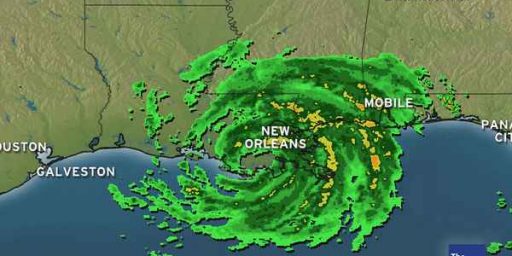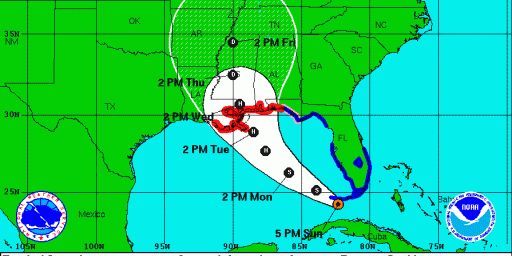Bush Is Warned on Katrina in Video
Nicole Gaouette reports that President Bush was warned that the New Orleans levees would break. The day they broke. Sort of.
Newly released video footage taken just hours before Hurricane Katrina battered the Gulf Coast shows that federal officials delivered stark warnings to President Bush and Homeland Security Secretary Michael Chertoff that the storm could lead to massive loss of life. “We are fully prepared,” Bush responded.
While the information in the video has been public for months, and was the subject of hearings and reports by Congress and the White House, the footage is giving new life to charges that the administration was detached and unresponsive in the face of one of the nation’s worst natural disasters.
The edited video, released by Associated Press, shows Max Mayfield, director of the National Hurricane Center in Miami, briefing state and federal officials — including Chertoff and Michael D. Brown, then director of the Federal Emergency Management Agency — on Aug. 28. Bush was at his Texas ranch and participated by videophone. Mayfield tells the officials he wants “to make it absolutely clear to everyone that there is potential for large loss of life — in the coastal areas from the storm surge,” and emphasizes that there is a “very, very grave concern” about the ability of the levees that separated Lake Pontchartrain from New Orleans to stand up against the storm.
On Sept. 1, Bush said on ABC’s “Good Morning America”: “I don’t think anybody anticipated the breach of the levees.”
Here’s the video, courtesy YouTube:
Seventeen paragraphs into the LAT story, though, we learn:
Associated Press spokesman Jack Stokes said that the news service had obtained raw footage of the entire briefing — as well as transcripts from seven days’ worth of similar government briefings — from a variety of sources.
The selectively edited video of the Aug. 28 briefing shows Brown at one end of a crowded conference table dotted with microphones, telling federal and state officials: “My gut tells me this is a bad one and a big one — this is, to put it mildly, the big one, I think.”It cuts to a shot of Bush, speaking by videophone from his ranch, assuring state officials that the federal government is fully prepared. The transcript shows that he asked no questions about the presentations on Katrina or the dire predictions.
Ed Morrissey goes deeper, digging up PDF transcripts of the August 28 and 29 meetings in the NYT archives. After discussing various quotes, he observes,
[T]he entire briefing that related to levees only focused on the effects of the wind on Lake Pontchartrain and its effect in pushing water over the top of the levees. Mayfield never even addressed the possibility of breaches in the levee walls. And in fact, the storm track shifted eastward in the final hours before Katrina hit, which eliminated much of the predicate for even the worries Mayfield expresses in this transcript.
Lyford Beverage adds,
The President said that no one anticipated the “breach” of the levees. The Director of the National Hurricane Center said that they couldn’t say whether the levees would be “topped.” Well, that’s the difference between your bathtub overflowing, which makes a mess, and collapsing, which is a disaster.
John Hinderacker notes that,
The AP says the transcripts show that Bush was “worried” about the levees failing. But the quote they cite is after Katrina hit, and after levee failures had been reported. This obviously has nothing to do with what was anticipated before the fact. What, then, is the AP’s basis for saying that “federal disaster officials warned President Bush and his homeland security chief before Hurricane Katrina struck that the storm could breach levees…”?
[…]
The last thing there was any shortage of in the days before Hurricane Katrina struck was warnings. The news media were full of often-hysterical predictions of death and devastation. The fact that a category 5 hurricane hitting the Gulf coast could cause catastrophic damage was obvious to everyone.
The real question, it seems to me, is one on which the AP article (and, as far as we know, the documents and video footage it is based on) sheds no light: how well prepared were the various local, state and federal agencies, and what was the quality of their response?
Kevin Aylward points out that the facts of the case are easily obtainable.
I invite you to look through our Katrina archives from the beginning – you can learn a lot about what actually happened and when. Wizbang was in the unique position to have one of our bloggers, Paul – an engineer by trade, who just so happened to live in New Orleans. That provided us with a unique local angle on the story.
On August 27, 2005 Paul noted everything discussed in the briefings seen on the AP video and more. How did he know this? Well for starters the entire New Orleans area had avoided a similar fate in 2004 when it looked like they were headed for a direct hit by a Category 5 hurricane (Ivan, not Andrew as I originally stated). The Katrina being discussed in the AP video is the monster Category 5 version of Katrina that was bearing down directly on New Orleans.
And that’s where the dishonesty in the AP story really lies. Contrary to popular belief New Orleans DID NOT take the brunt of Katrina. The Gulf Coast in Mississippi had that honor. As it veered east of New Orleans the force that Katrina hit the New Orleans area with was the equivalent of a Category 1 (or possibly Category 2) hurricane. On the video those officials are discussing a direct hit of a Category 5 storm, just as Paul was. A Category 5 storm didn’t hit New Orleans.
Quite right. Certainly, the federal response to Katrina could have been better. Even more clearly, the state and local government response was pitiful. But the idea that any of those people just ignored the problem and didn’t care about the people involved is simply unfounded.






Another drive by reporting…
The point being harped, at least in the areas I’ve seen this reported, is not the level of preparedness of fed/state/local agencies, but rather that Bush (and a lot of other people) knew about significant problems and did exactly nothing to prepare for them. More, that Bush instinctively lied to cover his ass when confronted with the colossal and ongoing failures in responding. Indeed, unless he literally slept through the entire few days leading up to landfall, his “nobody anticipated” statement is even more baldly nonsense.
Beverage and Hinderaker’s comments are particularly idiotic. The idea that Geroge W. Bush, whom even his supporters admit doesn’t do “words” well, was intentionally playing on the subtleties of ‘breach’ vs. ‘overtopping’ is laughable on its face. And Hinderaker tries to dodge the anticipation issue altogether by trying to draw attention to the pointless issue of when completely different quotes were reported.
I’ll grant that the environment at the time was highly chaotic, but good god man! This is FEMA and DHS we’re talking about here – their entire purpose is to deal with chaotic situations! To even imply that they were overwhelmed by the confusion is a de facto indictment of everyone involved for gross incompetence!
His name is Legion. His game is angry rhetoric. His argument is ad hominem. And all of it shows he is ill informed.
First, Katrina dealt the Florida, Mississippi and Louisiana coasts a far more devastating blow than New Orleans. FEMA’s response was generally deemed adequate in those regions. That was first, because the state and local officials there were more capable and performed better than their New Orleans counterparts, and because the density of the population was for the most part lower in those regions.
Second, the Press concentrated on New Orleans, and made it out to be a racial issue. It was not, of course, but that is one of the reasons that FEMA’s performance was under a microscope and its failings exaggerated. That is not to say its failings were not significant, because they were. But in the face of the largest natural disaster in the nation’s history, it would have been a miracle had significant failings not been exposed under such circumstances.
Third, the difference between what happened (breech of the levees) and what was predicted (topping of the levees) is not simply a difference in figure of speech. The risks of each of those situations are far different as any civil engineer will tell you.
Well, an ad hominem attack is generally considered to be one based on facts irrelevant to the current discussion, often involving a personal attack. This discussion is about what the White House was told about the threat from the storms & what was then done to prepare for/respond to the damage. I believe the testimony of Brown & Chertoff give ample evidence that they are both culpable and incompetent. You may disagree with my conclusions, but the attack is quite relevant.
A better example of ad hominem is your bringing up the racial accusations, which have exactly _nothing_ to do with this discussion. The title of the thread is “Bush is Warned on Katrina in Video”. The point is that even after being told (repeatedly, if Brownie is correct) about the potential threat to the entire Guld Coast area (not just NOLA), Bush unashamedly lied to avoid looking like an idiot in the aftermath.
Not to mention the fact that I’m _sure_ civil engineers know the difference between breach and overtop. But Bush is no civil engineer, and my point was that the defense Beverage offered up that Bush might be intimately familiar with those terms simply doesn’t hold water (no pun intended).